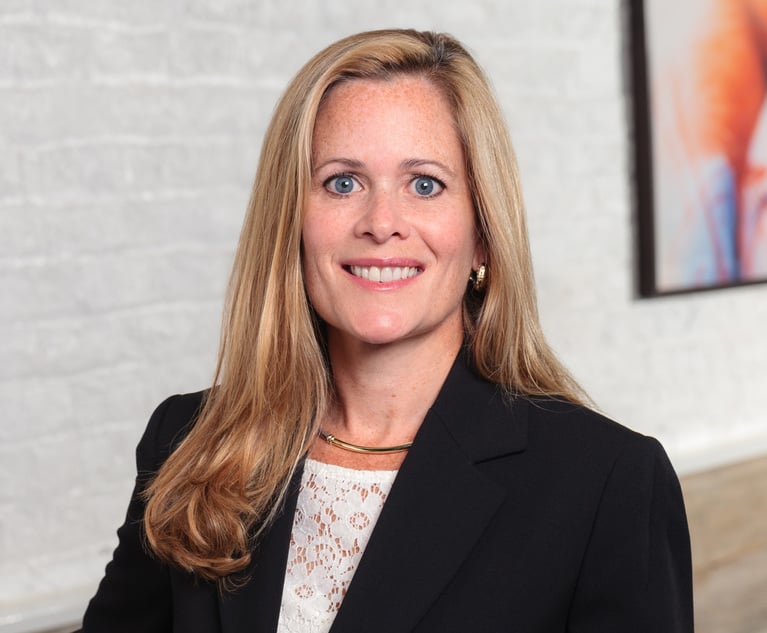Legal Tech Pitches Becoming 'Aggressive' and 'Demeaning': The Morning Minute
The news and analysis you need to start your day.
August 23, 2021 at 06:00 AM
4 minute read
Want to get this daily news briefing by email? Here's the sign-up.
|
WHAT WE'RE WATCHING
WILD PITCHES - Some legal ops professionals say they've noticed legal tech sales people becoming pushier and more tone-deaf over the course of the last year—and they don't like what they see, Law.com's Frank Ready reports. But c'mon, how bad could it really be? "It's going to come to a point where I feel that there's going to be a group of [corporate legal department] clients that are basically going to be an advisory panel that is just basically going to say, 'If you do not stop, we are going to blacklist you. And that's it. We're done,'" said Jack Thompson, assistant director, legal chief operations office at Sanofi. Yeah, OK, that's bad. James Michalowicz, senior manager, legal operations business performance at TE Connectivity, said he's also noticed pitches becoming "much more aggressive" recently. "Not only aggressive," Michalowicz added, "but sometimes they are demeaning. To the point where they say, 'Well if you're the person who isn't responsible for this area, send me to the person who really does know something.' That's how it comes across. And I find that offensive."
WESTERN INFLUENCE - The California market has seen an influx of new Big Law entrants in the last two years, as firm such as Paul, Weiss, Rifkind, Wharton & Garrison; Debevoise & Plimpton; and Jenner & Block, and international firms Freshfields Bruckhaus Deringer and Allen & Overy, added offices in the tech-heavy region. But it's not just offices. As Kristin Stark, a California-based principal and law firm consultant at Fairfax Associates. told Law.com's Jessie Yount, firms have also added rainmaking partners on the West Coast, who are likely to "grow their influence" and "step into leadership roles" thanks to their relationships with key corporate clients. "California has always been a strong market for the legal industry," Stark said. "It continues to see tremendous demand from large corporations, and that tends to breed very high-performing lawyers that service those clients."
SQUEEZED FOR INFORMATION - Lemonade, an AI-enabled provider of homeowners and renters insurance, was hit with a privacy class action Friday in New York Southern District Court over its alleged collection and use of biometric data. The suit, brought by Lowey Dannenberg, contends that Lemonade collects and stores biometric data including retina scans, voiceprints and face scans from customers who are required to upload videos during the claim submission process. Counsel have not yet appeared for the defendants. The case is 1:21-cv-07070, Pruden v. Lemonade, Inc. et al. Stay up on the latest deals and litigation with the new Law.com Radar.
|
EDITOR'S PICKS
|- CGO, CMO, CSO, CINO. How Should We Know? By Dan Packel
- 'A Win For Whichever Party Wants to Be in Federal Court': Impact of the Third Circuit's Ruling on COVID Business Losses By Charles Toutant
- 5 Tips to Get Mentorship Right By The Law.com Contributing Editors Group
- How to Win the Case Against the Wrong Running Shoe By Jonathan Jordan
- Strategy vs. Tactics: Two Sides of a Difficult Coin By Emil Sayegh
|
WHILE YOU WERE SLEEPING
INVESTING IN THE FUTURE - Allen & Overy has tripled the amount of bursaries it offers to students as it becomes the latest firm to improve its social mobility efforts, Law.com's Rose Walker reports. The firm has increased the number of bursaries it offers from two to six and the amount awarded to each student has increased from £10,500 to £15,000, which represents a £270,000 investment over three years from A&O, the firm said. The bursaries are awarded to high potential students about to embark on their university studies with a particular interest in a career in law. One of the places will be awarded to a student who identifies as being of Pakistani heritage, in memory of former A&O banking partner Atif Hanif, who passed away in December 2019 and had been instrumental in setting up the firm's Muslim network. A&O's bursary program lasts three years and is available to students who have participated in either of the firm's work experience programs, A&O Accelerate or Smart Start.
|
WHAT YOU SAID
"I believe strongly that these plaintiffs are making a mistake in joining a class action, as the class action will not maximize their individual recoveries."
This content has been archived. It is available through our partners, LexisNexis® and Bloomberg Law.
To view this content, please continue to their sites.
Not a Lexis Subscriber?
Subscribe Now
Not a Bloomberg Law Subscriber?
Subscribe Now
NOT FOR REPRINT
© 2024 ALM Global, LLC, All Rights Reserved. Request academic re-use from www.copyright.com. All other uses, submit a request to [email protected]. For more information visit Asset & Logo Licensing.
You Might Like
View All
How I Made Partner: 'Develop a Practice Area You Really Care About ,' Says Jennifer Gniady of Stradley Ronon


How I Made Office Managing Partner: 'When the Firm Needs Something Done, Raise Your Hand,' Says Eric Kennedy of Buchalter

How I Made Partner: 'Persevere Through the Challenging Times,' Says Jennifer Daglio of Hunton Andrews Kurth
Law Firms Mentioned
Trending Stories
Who Got The Work
Michael G. Bongiorno, Andrew Scott Dulberg and Elizabeth E. Driscoll from Wilmer Cutler Pickering Hale and Dorr have stepped in to represent Symbotic Inc., an A.I.-enabled technology platform that focuses on increasing supply chain efficiency, and other defendants in a pending shareholder derivative lawsuit. The case, filed Oct. 2 in Massachusetts District Court by the Brown Law Firm on behalf of Stephen Austen, accuses certain officers and directors of misleading investors in regard to Symbotic's potential for margin growth by failing to disclose that the company was not equipped to timely deploy its systems or manage expenses through project delays. The case, assigned to U.S. District Judge Nathaniel M. Gorton, is 1:24-cv-12522, Austen v. Cohen et al.
Who Got The Work
Edmund Polubinski and Marie Killmond of Davis Polk & Wardwell have entered appearances for data platform software development company MongoDB and other defendants in a pending shareholder derivative lawsuit. The action, filed Oct. 7 in New York Southern District Court by the Brown Law Firm, accuses the company's directors and/or officers of falsely expressing confidence in the company’s restructuring of its sales incentive plan and downplaying the severity of decreases in its upfront commitments. The case is 1:24-cv-07594, Roy v. Ittycheria et al.
Who Got The Work
Amy O. Bruchs and Kurt F. Ellison of Michael Best & Friedrich have entered appearances for Epic Systems Corp. in a pending employment discrimination lawsuit. The suit was filed Sept. 7 in Wisconsin Western District Court by Levine Eisberner LLC and Siri & Glimstad on behalf of a project manager who claims that he was wrongfully terminated after applying for a religious exemption to the defendant's COVID-19 vaccine mandate. The case, assigned to U.S. Magistrate Judge Anita Marie Boor, is 3:24-cv-00630, Secker, Nathan v. Epic Systems Corporation.
Who Got The Work
David X. Sullivan, Thomas J. Finn and Gregory A. Hall from McCarter & English have entered appearances for Sunrun Installation Services in a pending civil rights lawsuit. The complaint was filed Sept. 4 in Connecticut District Court by attorney Robert M. Berke on behalf of former employee George Edward Steins, who was arrested and charged with employing an unregistered home improvement salesperson. The complaint alleges that had Sunrun informed the Connecticut Department of Consumer Protection that the plaintiff's employment had ended in 2017 and that he no longer held Sunrun's home improvement contractor license, he would not have been hit with charges, which were dismissed in May 2024. The case, assigned to U.S. District Judge Jeffrey A. Meyer, is 3:24-cv-01423, Steins v. Sunrun, Inc. et al.
Who Got The Work
Greenberg Traurig shareholder Joshua L. Raskin has entered an appearance for boohoo.com UK Ltd. in a pending patent infringement lawsuit. The suit, filed Sept. 3 in Texas Eastern District Court by Rozier Hardt McDonough on behalf of Alto Dynamics, asserts five patents related to an online shopping platform. The case, assigned to U.S. District Judge Rodney Gilstrap, is 2:24-cv-00719, Alto Dynamics, LLC v. boohoo.com UK Limited.
Featured Firms
Law Offices of Gary Martin Hays & Associates, P.C.
(470) 294-1674
Law Offices of Mark E. Salomone
(857) 444-6468
Smith & Hassler
(713) 739-1250









